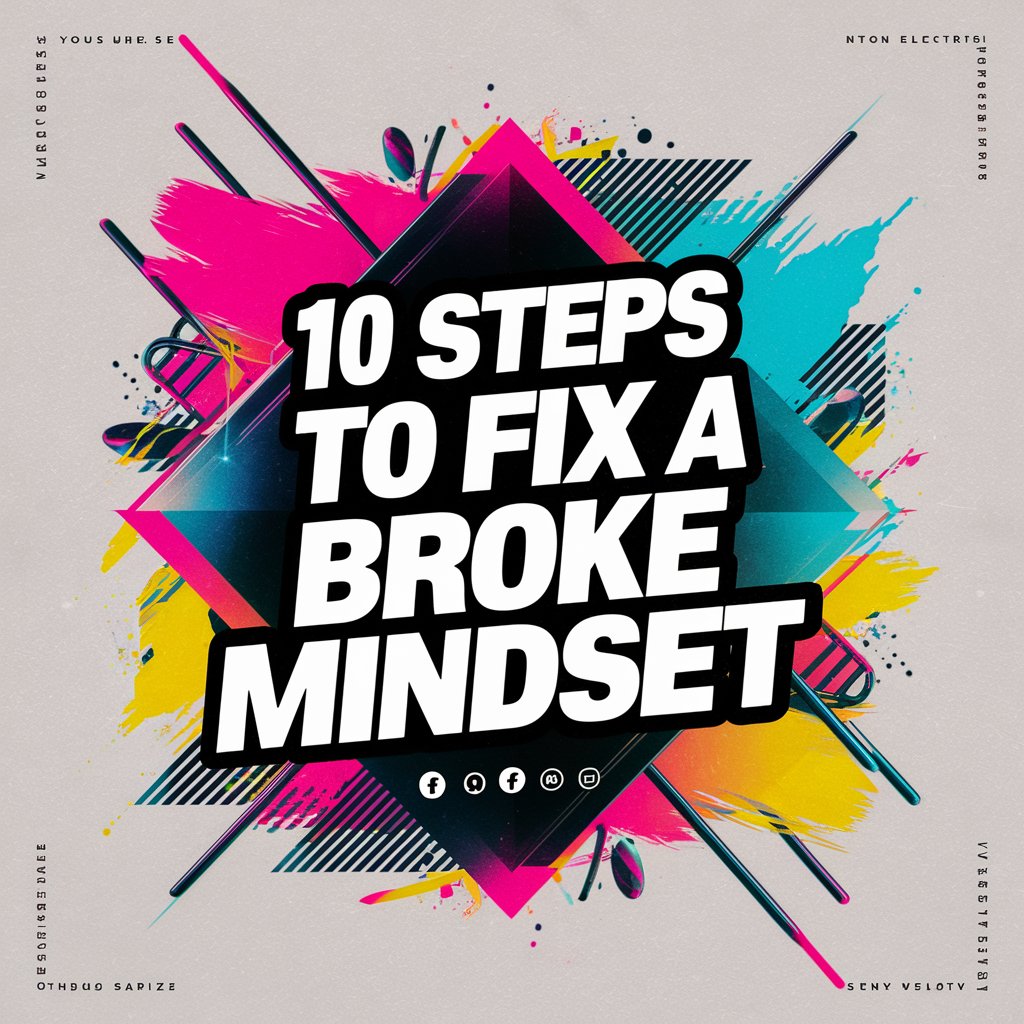Are you tired of feeling stuck, constantly battling self-doubt and financial stress?
Do you find yourself trapped in a cycle of negative thinking that keeps you from achieving your dreams? The truth is, your mindset might be the biggest obstacle standing between you and the success you desire.
A broke mindset isn’t just about money; it’s about limiting beliefs, fear of failure, and a lack of confidence that hold you back in every aspect of life. But it doesn’t have to be this way.
Imagine a life where you approach challenges with unwavering confidence, embrace opportunities with enthusiasm, and turn your dreams into reality.
Our guide on “10 Steps to Fix a Broke Mindset” will provide you with actionable strategies to transform your thinking, break free from the chains of negativity, and start living the life you’ve always wanted.
It’s time to take control, change your mindset, and unlock the success that’s been waiting for you.
Let’s get started on your journey to a better mindset and a brighter future.
This image is property of i.ytimg.com.
1. Admit Failure
Acknowledge current strategies are not working
Okay, let’s get real for a moment. Whatever you’ve been doing so far with your finances? It’s just not cutting it. Admit it.
You’ve probably been trying to stick to the same old budget, maybe even tried a few get-rich-quick schemes, or took financial advice from people who didn’t really know what they were talking about.
It’s time to face the facts: your current strategies are simply not working. Admitting failure isn’t easy, but it’s the crucial first step towards making any meaningful change. You can’t fix a problem you refuse to acknowledge.
Identify areas of your financial life that need change
Once you’ve accepted that the current way isn’t working, it’s time to identify the areas that really need a makeover.
Is it your spending habits?
Your lack of savings? Maybe you’re carrying around a heavy load of debt that just won’t seem to go away.
Take a hard look at all aspects of your financial life and pinpoint where things are going wrong.
This might be uncomfortable, but it’s the only way you’ll be able to move forward effectively.
2. Seek Better Financial Advice
Recognize the shortcomings of current advice
Now that we’ve got the difficult admissions out of the way, let’s talk about the advice you’ve been getting. If you’ve been taking financial tips from friends, family, or even random internet forums without much discretion, it’s no wonder things aren’t looking up. The unfortunate reality is that well-meaning advice isn’t always good advice. Recognize the shortcomings and inadequacies of the advice you’ve been following. Sometimes, it’s just not applicable to your unique situation, or worse, it’s simply misguided.
Identify reputable sources for financial guidance
So, where do you turn for good advice? Look for credible, reputable sources that are grounded in financial expertise. Books written by well-known financial experts, online courses from trusted platforms, and consultations with certified financial planners are all excellent starting points. Reliable sources will have positive reviews, a trail of success stories, and credentials that speak to their legitimacy. Your financial future is too important to entrust to just anyone.
3. Learn from Others
Observe successful people’s habits
Ever wonder how certain people always seem to have their finances together? It’s not luck—it’s habits. Start observing people who are financially successful. How do they manage their money? What habits do they practice regularly? They are likely budgeting meticulously, investing wisely, and constantly educating themselves about financial trends. Take notes and identify common patterns that you can emulate in your own life.
Adopt strategies that have proven successful for others
It’s one thing to observe and another to implement. Adopt the strategies that have worked for others. If they’ve had success with investing in stocks, maybe it’s time for you to understand the stock market better. If they swear by a particular budgeting method, give it a try. You don’t have to reinvent the wheel; leveraging the lessons others have already learned can fast-track your path to financial stability.
4. Change Habits
Reevaluate your priorities and values
Changing your habits isn’t just about cutting out lattes or dining out less frequently; it calls for a full-fledged reevaluation of your priorities and values. What do you really want from life? More freedom? Less stress from debt? Start aligning your financial habits with these larger goals. This means you might have to shift your focus from short-term pleasures to long-term gains. It’s a mindset change that can completely alter the trajectory of your financial future.
Implement new routines that foster financial growth
Once you’ve reevaluated your priorities, it’s time to translate that into actionable, day-to-day routines. Set up automatic savings transfers, start using apps that track your spending, and make a habit of regularly reviewing your financial statements. These small, consistent actions add up over time and will foster financial growth. Trust the process and stay committed to your new routines.
5. Take Responsibility
Stop blaming external factors for your financial problems
It’s easy to blame external factors—bad luck, the economy, your upbringing—for your financial woes. And while these factors can undoubtedly influence your situation, continuing to blame them won’t solve your problems. It’s time to take full responsibility for your financial state. This isn’t about blaming yourself, but about empowering yourself to make changes. If you own the problem, you can own the solution too.
Cultivate a mindset of self-reliance and continuous learning
Taking responsibility also means cultivating a mindset of self-reliance and continuous learning. Understand that no one is going to fix your finances for you. It’s up to you to seek out knowledge, adapt, and continually improve your financial literacy. Read books, take courses, and always be on the lookout for ways to enhance your understanding of financial matters. The more you know, the better equipped you’ll be to handle whatever comes your way.
6. Keep Goals Private
Avoid sharing new objectives prematurely
When you set new financial goals, it’s tempting to share them with everyone—to seek validation and support. But here’s the thing: sharing goals prematurely can sometimes sap your motivation. The initial praise might trick your brain into feeling you’ve already achieved something, diminishing your drive to actually follow through. Keep your new objectives to yourself until you’ve made significant headway. By then, your achievements will speak for themselves.
Focus on your goals without external distractions
By keeping your goals private, you’re also better able to focus without external distractions. You won’t have to field unsolicited advice, skepticism, or negativity from others. This allows you to zero in on what matters—actual progress. Free from external pressures, you can develop a clear plan and execute it with single-minded determination.
7. Find Supportive Peers
Connect with like-minded individuals
Even though it’s wise to keep your goals private initially, having a support system of like-minded individuals can be incredibly beneficial. Surround yourself with people who are also committed to improving their finances. These peers can provide encouragement, share tips, and hold you accountable. They’re facing similar challenges, and together, you can help each other stay on track and motivated.
Surround yourself with people who are also improving their finances
Your environment has a significant impact on your behavior. Spend time with people who are making positive financial changes in their own lives. Their habits and mindset will naturally influence you to stay committed to your financial goals. You can learn a lot from their experiences and vice versa, creating a mutually beneficial environment that fosters growth.
8. Avoid Poor Decisions
Identify and stop making unwise financial choices
It’s crucial to identify the poor financial decisions you’ve been making and put an end to them. Whether it’s impulse buying, taking on high-interest debt, or failing to save consistently, recognizing these pitfalls is the first step. Once identified, work on strategies to avoid these unwise choices. Create boundaries, set up safeguards, and make a commitment to yourself to stick to smarter financial practices.
Build discipline to maintain good financial habits
Building discipline is essential to maintaining good financial habits. This might mean setting strict budgets, automating your savings, or regularly revisiting your financial goals and progress. Discipline is like a muscle—the more you work on it, the stronger it gets. Over time, making wise financial decisions will become second nature, and you’ll find it easier to stick to good habits even when challenges arise.
1o. Be Punctual
Consistently show up on time for commitments
Financial success isn’t just about money management; it’s also about how you handle other aspects of your life. Being punctual is a sign of reliability and responsibility. Consistently showing up on time for commitments, whether they are work-related or personal, builds a reputation of dependability. This trait can open doors to opportunities that can positively impact your financial situation.
Demonstrate reliability and responsibility
When you demonstrate reliability and responsibility, people take notice. Employers, clients, and even friends and family will see you as someone who can be trusted with more significant responsibilities—and often, better opportunities. This can lead to promotions, new job offers, and other opportunities that can enhance your financial well-being. So, always strive to be a person of your word, show up on time, and follow through on your commitments.
Conclusion
Recap the importance of each step
Let’s wrap this up. To truly transform your financial future, you need to admit that your current strategies are failing and identify what needs to change.
Seeking better financial advice, learning from others, and observing successful habits are crucial. Changing your habits and taking full responsibility for your finances sets the foundation.
Keep your goals private to maintain focus, and surround yourself with supportive, like-minded individuals. Avoid making poor financial decisions and build the discipline to maintain good habits.
Lastly, be punctual and demonstrate reliability to pave the way for more significant opportunities.
Encourage the reader to take action and implement these steps
You’ve got the blueprint; now it’s time to take action. These steps are powerful, but only if they’re implemented.
Start today—admit where you’ve gone wrong, seek better advice, learn from those who’ve succeeded, and make the necessary changes to your habits and mindset.
Take full responsibility for your financial life, keep your eyes on your goals, and find a supportive community.
Avoid poor decisions, be punctual, and watch how these small changes can lead to substantial financial growth. You’ve got this!







